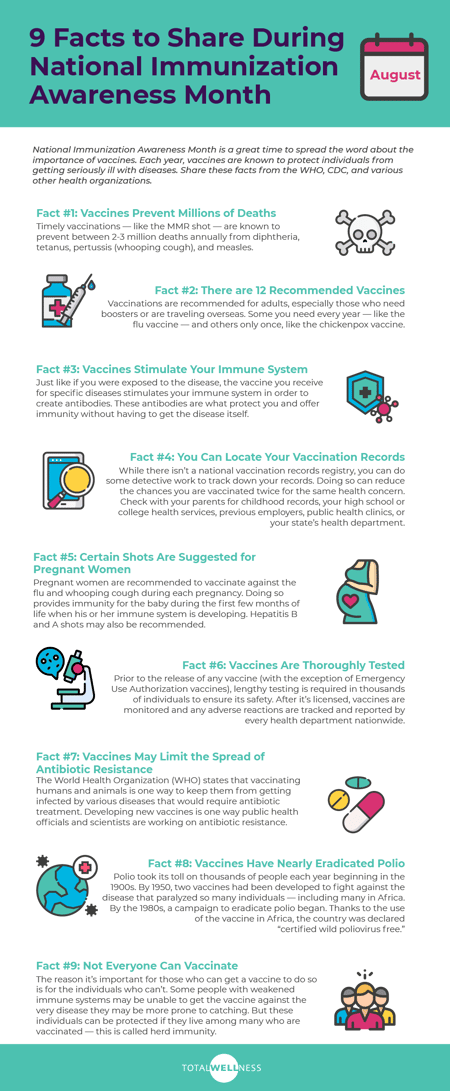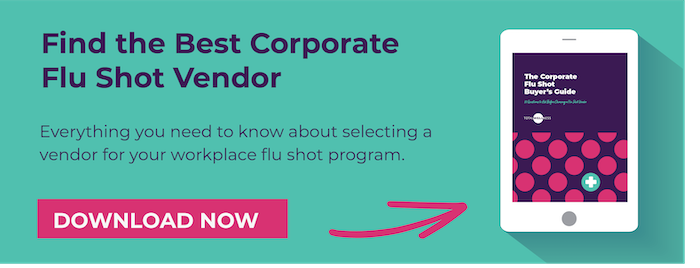 Looking for a health observance to promote at work next month?
Looking for a health observance to promote at work next month?
August is National Immunization Awareness Month, an annual observance dedicated to the importance of vaccinations for all ages. For employers, this is a great time to raise awareness about which vaccines adults need, reasons to vaccinate, and how to find vaccination sites with ease.
Since the COVID vaccine rollout, there has been much interest in vaccines, how they work, why we need them, etc.
National Immunization Awareness Month is a great opportunity to dispel COVID vaccine myths and update workers on other shots they may need beyond the COVID shot.
Why Vaccines are Important
The medical world considers vaccines as one of the most effective ways to prevent infectious diseases. While childhood vaccines are the most commonly thought of, adults actually need vaccines, too, because vaccinations protect individuals, their families, and their communities.
Reasons to vaccinate include:
- Vaccines can offer peace of mind - Shots can provide protection from serious diseases and make you worry less about catching one. Some shots provide 3-in-1 protection, too, like the MMR — which stands for measles, mumps, and rubella. While kids are most often required to have the MMR shot for school, this vaccine in particular may be required for overseas travel or frontline healthcare workers.
- Vaccines lower your chance of spreading disease - If enough people are vaccinated against a particular disease, it can reduce or even eliminate some diseases as has been talked about recently with the COVID vaccine. This has been the case for the polio vaccine. Diseases like diphtheria and measles have been reduced by up to 99.9% since the introduction of those vaccines.
- Vaccines protect your body - Vaccines provide your body immunity by creating antibodies that protect you from diseases. Medical professionals have found it’s safer for the immune system to create this antibody through vaccination versus catching it and treating it.
Which Vaccines Do Adults Need?
Even if you received vaccines as a child, you’ll still need to update them periodically throughout your life. Immunity from childhood vaccines is known to wear off over time. Plus, as an adult, you may be at risk for different diseases, especially if you travel frequently overseas.
All adults need the following vaccines:
- Annual influenza (flu)
- Td or Tdap - This acronym stands for tetanus, diphtheria, and pertussis. Diphtheria and pertussis infect from person to person, while tetanus infects the body through an open wound or cut.
Always discuss any concerns with your healthcare provider prior to receiving a vaccination. This is important if you’ve ever had an allergic reaction to a vaccine or if you have certain health conditions like Guillain-Barré Syndrome.
Are Vaccines Safe?
Before ever hitting the market, vaccines are required to go through years of testing before the Food and Drug Administration (FDA) approves them for use. The Centers for Disease Control and Prevention (CDC) and FDA continue to track safety and reaction numbers on all licensed vaccines.
Some vaccines may cause a mild reaction in individuals. The most common ones include redness, soreness, or swelling at the site of injection.
Related: How to Avoid a Sore Arm After Your Workplace Flu Shot
Where Do I Find Vaccines?
For most individuals, you can get recommended vaccines at your doctor’s office during your well visits. You’ll also find you can get vaccines at health departments, federally-funded health centers, travel clinics, and local pharmacies, too.
Need to get vaccinated? Find the closest vaccination site to you here.
Prior to getting a new vaccine, ask your healthcare provider to look up your information in the state’s health department system. This will indicate when and where you got your shots last if you didn’t transfer your records to your new physician’s office.
If you got married since the last time you received a vaccination, be sure to have a medical professional search under your maiden name, too. If you have moved from out of state, you may need to contact your previous state’s health department or previous physician’s office to send along updated vaccination records.
How Can I Learn More About Vaccines?
It’s easy to get caught up in false information that spreads on the web when it comes to vaccines and the vaccination process. When researching vaccines, it’s important to check out information from accurate sources.
You can:
- Chat with your healthcare provider
- Ask to see the inserts for the vaccination
- Contact your local state or health department
- Call the pharmaceutical company that makes the vaccination
- Call the Centers for Disease Control and Prevention (CDC) at 1-800-232-4636
The more well-informed you are, the better you can make a decision for yourself and your family when it comes to vaccinations.
Promoting National Immunization Awareness Month
National Immunization Awareness Month is a pretty big deal this year. Given that the world was shocked by a global pandemic, immunization is being seen as more than a buzzword and more as a necessity to end the COVID virus.
As an employer, you can promote and observe National Immunization Awareness Month in various ways to drive the point home.
How to promote it:
- Email this resource - Feel free to forward this content in whole to your employees. Or copy and paste it into a newsletter. The goal is to share as much information as possible on immunizations during this month!
- Share where to find vaccines - Provide your employees with a list of contacts for local clinics and providers to make it easier to update their vaccinations.
- Plan ahead for flu season - Let your employees know you’re planning a flu shot clinic for the fall before flu season strikes. Start now and schedule your clinic date to start planning out your marketing efforts.
- Pass along the adult vaccine assessment - Since vaccines are recommended for adults based on a variety of health parameters, it’s important to remind employees that shots are an ongoing health maintenance item. Share this assessment to help them figure out which vaccines they may need.
- Distribute graphics - NIAM has a ton of great graphics to use on social media. Whether your company uses Twitter, Facebook, Instagram, or LinkedIn, it’s worth checking out these free promotional tools to use.
- Learn how to talk about the COVID-19 vaccine - The topic of the COVID-19 vaccine isn’t going away anytime soon. Learn how to best chat with friends, family, and coworkers with this helpful CDC guide.
How will your company recognize National Immunization Awareness Month? Share in the comments below!



